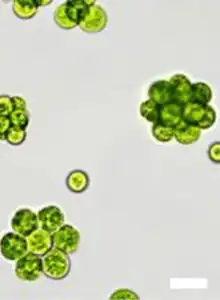| Deasonia | |
|---|---|
 | |
| Deasonia sp. | |
| Scientific classification | |
| (unranked): | Viridiplantae |
| Division: | Chlorophyta |
| Class: | Chlorophyceae |
| Order: | Chlamydomonadales |
| Family: | Actinochloridaceae |
| Genus: | Deasonia H. Ettl & J. Komárek, 1982[1] |
| Type species | |
| Deasonia prolifera | |
| Species[1] | |
| |
Deasonia is a genus of green algae, in the family Actinochloridaceae.[1] It is found in soils.[2]
Deasonia is a single-celled organism. Young cells are ellipsoidal or ovoid, while mature cells are consistently spherical with a smooth, thickened cell wall. In young cells, the chloroplast is cup-shaped and parietal, with an off-center pyrenoid; in mature cells, the chloroplast may have bifurcations and indentations and eventually forms an irregular network, with the pyrenoid in the center. Mature cells are multinucleate.[2]
References
- 1 2 3 Guiry, M.D.; Guiry, G.M. "Deasonia". AlgaeBase. World-wide electronic publication, National University of Ireland, Galway. Retrieved 2022-02-23.
- 1 2 Shubert, Elliot; Gärtner, Georg (2014). "Chapter 7. Nonmotile Coccoid and Colonial Green Algae". In Wehr, John D.; Sheath, Robert G.; Kociolek, J. Patrick (eds.). Freshwater Algae of North America: Ecology and Classification (2 ed.). Elsevier Inc. ISBN 978-0-12-385876-4.
This article is issued from Wikipedia. The text is licensed under Creative Commons - Attribution - Sharealike. Additional terms may apply for the media files.